 Nagisa Ni Te is primarily the work of Shinji Shibayama and his partnerand muse Masako Takeda. Over the course of four albums, the Japanesepsych-folk duo has carved out their own niche among their moreavant-leaning Japanese contemporaries, creating subtle and lovely popmusic that floats by like a gentle summer breeze. Their name, whichmeans "On the Beach" in Japanese, seems to be a direct reference toNeil Young's classic album of the same name, and they do seem to takesome musical inspiration from Young as well. Though their music at timeseems minimal and unadorned, there is a deceptive simplicity at work intheir arrangements. A wide range of instruments is used, as well asgenius multi-tracked vocal harmonies, but always in a refreshinglyuncomplicated way that never seems too calculated. Their chief subjectis nature, and love of the same, as evidenced by the included lyrics,given an English translation by The Wire's resident Japanophile Alan Cummings. The Same As a Flowerevokes the pastoral simplicity of nature in understated surrealistterms, where the sky is "tall as a flower," "brambles taste sweet" andthe sky is "shattered by fish." The album seems to be the duo's mostgelled statement thus far, full of beautiful melodies that etchedthemselves into my brain quite naturally after only a few listens. Theopening title track has a catchy chorus and a catchier melody, a simplesweet duet about the contemplation of a flower. Though Nagisa Ni Te'sprogressive tendencies and eclectic influences seem often to suggestIncredible String Band or other 60s acts, their consistentlyuncluttered arrangements put them closer in style to Belle andSebastian, without the twee affectation. Using only an electric guitarand evocative vocal overdubbing, "River" is able to hauntingly evokethe gentle currents and eddies of the song's namesake. "Wife" is aninstrumental intermission that recalls George Harrison's solo work, orthe Beach Boys' "Fall Breaks and Back to Winter." "Bramble" floats byat a leisurely pace for 11 minutes, ending with a hypnotic guitar andmellotron duet. It's organically psychedelic without resorting to thetired repertoire of studio gimmickry that characterizes most modernpsych. Truly, the album is lighter than air, and constantly threatensto float away like so many dandelion spores. But while it's stilltangible, it's as lovely and uncluttered as any psych album you'relikely to hear all year.
Nagisa Ni Te is primarily the work of Shinji Shibayama and his partnerand muse Masako Takeda. Over the course of four albums, the Japanesepsych-folk duo has carved out their own niche among their moreavant-leaning Japanese contemporaries, creating subtle and lovely popmusic that floats by like a gentle summer breeze. Their name, whichmeans "On the Beach" in Japanese, seems to be a direct reference toNeil Young's classic album of the same name, and they do seem to takesome musical inspiration from Young as well. Though their music at timeseems minimal and unadorned, there is a deceptive simplicity at work intheir arrangements. A wide range of instruments is used, as well asgenius multi-tracked vocal harmonies, but always in a refreshinglyuncomplicated way that never seems too calculated. Their chief subjectis nature, and love of the same, as evidenced by the included lyrics,given an English translation by The Wire's resident Japanophile Alan Cummings. The Same As a Flowerevokes the pastoral simplicity of nature in understated surrealistterms, where the sky is "tall as a flower," "brambles taste sweet" andthe sky is "shattered by fish." The album seems to be the duo's mostgelled statement thus far, full of beautiful melodies that etchedthemselves into my brain quite naturally after only a few listens. Theopening title track has a catchy chorus and a catchier melody, a simplesweet duet about the contemplation of a flower. Though Nagisa Ni Te'sprogressive tendencies and eclectic influences seem often to suggestIncredible String Band or other 60s acts, their consistentlyuncluttered arrangements put them closer in style to Belle andSebastian, without the twee affectation. Using only an electric guitarand evocative vocal overdubbing, "River" is able to hauntingly evokethe gentle currents and eddies of the song's namesake. "Wife" is aninstrumental intermission that recalls George Harrison's solo work, orthe Beach Boys' "Fall Breaks and Back to Winter." "Bramble" floats byat a leisurely pace for 11 minutes, ending with a hypnotic guitar andmellotron duet. It's organically psychedelic without resorting to thetired repertoire of studio gimmickry that characterizes most modernpsych. Truly, the album is lighter than air, and constantly threatensto float away like so many dandelion spores. But while it's stilltangible, it's as lovely and uncluttered as any psych album you'relikely to hear all year.
Two new shows just for you. We have squeezed out two extended release episodes for this weekend to get you through this week. They contain mostly new songs but there's also new issues from the vaults. The first show features music from Rider/Horse, Mint Field, Robert Aiki Aubrey Lowe, Anastasia Coope, ISAN, Stone Music, La Securite, Bark Psychosis, Jon Rose, Master Wilburn Burchette, Umberto, Wand, Tim Koh, Sun An, and Memory Drawings. The second episode has music by Laibach, Melt-Banana, Chuck Johnson, X, K. Yoshimatsu, Dorothy Carter, Pavel Milyakov, Violence Gratuite, Mark Templeton, Dummy, Endon, body / negative, Midwife, Alberto Boccardi, Divine. Cow in Maui from Veronika in Vienna. Get involved: subscribe, review, rate, share with your friends, send images! |



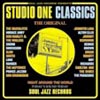 On the 4th of May this year Clement "Sir Coxsone" Dodd died. He is oneof the most important figures in the history of reggae music; he openedand ran the now famous Studio One recording facility in Kingston, waspresent and perhaps partially responsible for many of the stylisticdevelopments within reggae, and put out some of the first records fromsuch individuals as the Heptones, Burning Spear, and the Wailers."Studio One Classics" collects 18 tracks from 1964 to 1981 and itclearly demonstrates the brilliance, depth, and soul of reggae and allits variations. Carlton and the Shoes of 1968 are placed next to theHeptones of 1978 and the Wailers from 1965 are heard next to tracksfrom Sugar Minott and Lone Ranger from 1980 and 1981; while the styleschange and shift from track to track and attitudes slip from relaxed topoppin' and feverish, what this compilation makes so evident is thatthere is more heart and love in these tracks than any dancehall orR&B performer today could ever hope to touch on. Hearing DennisBrown perform "No Man Is an Island" or Sound Dimension bleed "RockfortRock" is like a slap to the face because its thatmuch better than anything that's been thrown onto the radio ortelevision screen. And while I can appreciate Bob Marley, listening theWailers bop through "Simmer Down" makes me wonder why this part of hiscareer hasn't received more attention than anything else. Every lasttrack feels fresh, too, with songs like "Rougher Yet" and "Pretty LooksIsn't All" exhibiting all the sounds and feelings that a large numberof future dub, reggae, soul, and jazz lovers would emulate and developout of. This is an excellent set of songs from one of the mostimportant, if not the most important, studios in all of reggae.The beginning of every change in reggae history can be heard here andat the top of its form - it simply doesn't get much better than this.If only Prince Far I and Toots and the Maytals had been includede onthis compilation, then it could have been perfect.
On the 4th of May this year Clement "Sir Coxsone" Dodd died. He is oneof the most important figures in the history of reggae music; he openedand ran the now famous Studio One recording facility in Kingston, waspresent and perhaps partially responsible for many of the stylisticdevelopments within reggae, and put out some of the first records fromsuch individuals as the Heptones, Burning Spear, and the Wailers."Studio One Classics" collects 18 tracks from 1964 to 1981 and itclearly demonstrates the brilliance, depth, and soul of reggae and allits variations. Carlton and the Shoes of 1968 are placed next to theHeptones of 1978 and the Wailers from 1965 are heard next to tracksfrom Sugar Minott and Lone Ranger from 1980 and 1981; while the styleschange and shift from track to track and attitudes slip from relaxed topoppin' and feverish, what this compilation makes so evident is thatthere is more heart and love in these tracks than any dancehall orR&B performer today could ever hope to touch on. Hearing DennisBrown perform "No Man Is an Island" or Sound Dimension bleed "RockfortRock" is like a slap to the face because its thatmuch better than anything that's been thrown onto the radio ortelevision screen. And while I can appreciate Bob Marley, listening theWailers bop through "Simmer Down" makes me wonder why this part of hiscareer hasn't received more attention than anything else. Every lasttrack feels fresh, too, with songs like "Rougher Yet" and "Pretty LooksIsn't All" exhibiting all the sounds and feelings that a large numberof future dub, reggae, soul, and jazz lovers would emulate and developout of. This is an excellent set of songs from one of the mostimportant, if not the most important, studios in all of reggae.The beginning of every change in reggae history can be heard here andat the top of its form - it simply doesn't get much better than this.If only Prince Far I and Toots and the Maytals had been includede onthis compilation, then it could have been perfect. 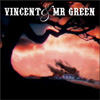 Someone in this band has been to hell and back; the vocalist emulates enough emotions to make a manic depressive feel good about the way life is going. Depravity, arson, prostitution, obsession, betrayal, manipulation, and alcoholism are just a few of the topics the lyricist conjures up in the first half of the album. The music is a fitting combination of manipulated beats, chamber music, sickly lounge deliveries, and darkly lit soundscapes fluctuating between old phonograph recordings from the 1920's and blazingly confrontational arrangements that could've only been born out of the heart of a psychopath.
Someone in this band has been to hell and back; the vocalist emulates enough emotions to make a manic depressive feel good about the way life is going. Depravity, arson, prostitution, obsession, betrayal, manipulation, and alcoholism are just a few of the topics the lyricist conjures up in the first half of the album. The music is a fitting combination of manipulated beats, chamber music, sickly lounge deliveries, and darkly lit soundscapes fluctuating between old phonograph recordings from the 1920's and blazingly confrontational arrangements that could've only been born out of the heart of a psychopath. Last I heard from this Japanese label was their release of Fennesz's Live in Japan,something of a surprise addition to that artist's catalogue, and onethat offered both a glimpse at new developments in his too-familiarstyle, and a pleasantly indulgent rebuff against those critics ready topredict, or pounce on, a new masterpiece. On its latest release, Headzgives another digital guitar hero, Rafael Toral, a similar opportunityto avoid quick canonization and indulge some new ideas over the courseof one disc-length track. On past records, Toral produced everythingfrom ecstatic, shoegazing jams to multi-sectioned, epic-length texturalexplorations, often using the juxtaposition between his moreintentionally rockist moments and the purer ambient passages to createan unique soundworld that embraces both with equal fervor. Harmonic Series 2 is a significant departure from the digestible, pop-length drones that filled Toral's last record, The Violence of Discovery, The Calm of Acceptance,though the switch to less-concise, more demanding composition iswelcome. The 43-min. piece, for sinewave, guitar and analogelectronics, marks the artist's first use of the computer as autonomousmusical instrument, its waveforms acting as the synthetic equivalent ofa guitarist's blending harmonic tones. Toral's use of the sinewave liesfar from the alienating compositions usually associated with such pureand relentless sounds, and while Harmonic Series does avoid thecosmic elegance that has characterized the artist's work thus far, thepiece remains surprisingly inviting. Weightless strands of e-bowedfeedback and gently throbbing harmonic layers intertwine with thecomputer's tones to create the most substantial portions of thecomposition, a fluid surface of constant dissolve and regeneration.Through a meticulous cycle of blends and pans, Toral reaches a powerfulsonic density from the tight flux of three or four blank tones ratherthan a congestion or distortion of the stereo field. The gritty,psychedelic edge that touched Toral's early work is totally absent;instead Harmonic Series seems to develop out of the resultingnegative space, a lyric-less tone poem to the information age, full ofhaunting, passive currents. Parts of the piece even recall the warpingeffects in Coil's Time Machines. The artwork tells it best:gone are the floating passenger jets that graced the covers of so manyToral recordings; here he offers only dark futurism, an empty skystalked by silent electrical towers. Given the track's length and theresistance of the pure tones to any recognizable or repeated dynamic,an overarching mood or directive within Harmonic Series is hardto locate. The steady flow and warm tonalities of the piece keep itinviting, but never to the rapturous extremes of the artist's otherlong-form composition, Wave Field. It seems fitting, if a bitpredictable or even overstated on such a sprawling release, that theartist's embrace of new technology should lead his music towards morewayward, alien territories.
Last I heard from this Japanese label was their release of Fennesz's Live in Japan,something of a surprise addition to that artist's catalogue, and onethat offered both a glimpse at new developments in his too-familiarstyle, and a pleasantly indulgent rebuff against those critics ready topredict, or pounce on, a new masterpiece. On its latest release, Headzgives another digital guitar hero, Rafael Toral, a similar opportunityto avoid quick canonization and indulge some new ideas over the courseof one disc-length track. On past records, Toral produced everythingfrom ecstatic, shoegazing jams to multi-sectioned, epic-length texturalexplorations, often using the juxtaposition between his moreintentionally rockist moments and the purer ambient passages to createan unique soundworld that embraces both with equal fervor. Harmonic Series 2 is a significant departure from the digestible, pop-length drones that filled Toral's last record, The Violence of Discovery, The Calm of Acceptance,though the switch to less-concise, more demanding composition iswelcome. The 43-min. piece, for sinewave, guitar and analogelectronics, marks the artist's first use of the computer as autonomousmusical instrument, its waveforms acting as the synthetic equivalent ofa guitarist's blending harmonic tones. Toral's use of the sinewave liesfar from the alienating compositions usually associated with such pureand relentless sounds, and while Harmonic Series does avoid thecosmic elegance that has characterized the artist's work thus far, thepiece remains surprisingly inviting. Weightless strands of e-bowedfeedback and gently throbbing harmonic layers intertwine with thecomputer's tones to create the most substantial portions of thecomposition, a fluid surface of constant dissolve and regeneration.Through a meticulous cycle of blends and pans, Toral reaches a powerfulsonic density from the tight flux of three or four blank tones ratherthan a congestion or distortion of the stereo field. The gritty,psychedelic edge that touched Toral's early work is totally absent;instead Harmonic Series seems to develop out of the resultingnegative space, a lyric-less tone poem to the information age, full ofhaunting, passive currents. Parts of the piece even recall the warpingeffects in Coil's Time Machines. The artwork tells it best:gone are the floating passenger jets that graced the covers of so manyToral recordings; here he offers only dark futurism, an empty skystalked by silent electrical towers. Given the track's length and theresistance of the pure tones to any recognizable or repeated dynamic,an overarching mood or directive within Harmonic Series is hardto locate. The steady flow and warm tonalities of the piece keep itinviting, but never to the rapturous extremes of the artist's otherlong-form composition, Wave Field. It seems fitting, if a bitpredictable or even overstated on such a sprawling release, that theartist's embrace of new technology should lead his music towards morewayward, alien territories.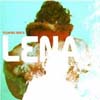 Sometime during the latter half of this year, and much to thedispleasure of my incredibly attractive girlfriend, I developed arenewed interest in dub music. Picking through CD store bins, as Iregularly do, I snagged copies of Horace Andy, Keith Hudson, and LeePerry productions, eagerly immersing myself in the fantastic reverbsand echo chambers. The latest Dubblestandart album, which I reviewed afew issues back, as well as my rediscovering the original brillianttrilogy of Pole albums, sparked my appetite for new works in the genre.Thankfully, Floating Roots,Mathias Deplanque's second album as Lena for Quatermass, more thansatiates my hunger with some of the best "digi-dub" outside of the~scape label family. "Wax Model" opens the album with a slow, exactingbeat amidst a moist palette of Vladislav Delay style synth beds. TheJamaican-influenced sound that is somewhat absent on the first trackquickly emerges on "Under False Rulers," a bass-heavy number thatfeatures one of several appearances by MC Tablloyd. Known by some forhis work with 69db of Spiral Tribe, Tablloyd's style and tone varieswildly at times, yet only occasionally interferes with Lena's busy,bubbly soundscapes. The highly danceable cut "Wah Gwan" features hismost satisfying contribution, a vibrant and perhaps nonlinear riffingtreated with delay effects. The only other vocalist on the album,one-time Black Dog collaborator Black Sifichi, contributes somedeep-throat spoken word poetry to the head-nodding "Storm Blown". Theinstrumental tracks that close out the album, including two versions of"Mountain Dub", further shows off Lena's skills as a producer, but nonemore reverent of true dub music as the title track. "Floating Roots"grooves along with a dark tone and a keen, respectful understanding ofthe inspired and inspirational artists who came before him. Whilebridging the dub tradition with the clinical aesthetics of minimaltechno is nothing new in 2004, Lena pulls together all the rightelements for a balanced modern album that begs for repeat listening andappropriate herbal accompaniment.
Sometime during the latter half of this year, and much to thedispleasure of my incredibly attractive girlfriend, I developed arenewed interest in dub music. Picking through CD store bins, as Iregularly do, I snagged copies of Horace Andy, Keith Hudson, and LeePerry productions, eagerly immersing myself in the fantastic reverbsand echo chambers. The latest Dubblestandart album, which I reviewed afew issues back, as well as my rediscovering the original brillianttrilogy of Pole albums, sparked my appetite for new works in the genre.Thankfully, Floating Roots,Mathias Deplanque's second album as Lena for Quatermass, more thansatiates my hunger with some of the best "digi-dub" outside of the~scape label family. "Wax Model" opens the album with a slow, exactingbeat amidst a moist palette of Vladislav Delay style synth beds. TheJamaican-influenced sound that is somewhat absent on the first trackquickly emerges on "Under False Rulers," a bass-heavy number thatfeatures one of several appearances by MC Tablloyd. Known by some forhis work with 69db of Spiral Tribe, Tablloyd's style and tone varieswildly at times, yet only occasionally interferes with Lena's busy,bubbly soundscapes. The highly danceable cut "Wah Gwan" features hismost satisfying contribution, a vibrant and perhaps nonlinear riffingtreated with delay effects. The only other vocalist on the album,one-time Black Dog collaborator Black Sifichi, contributes somedeep-throat spoken word poetry to the head-nodding "Storm Blown". Theinstrumental tracks that close out the album, including two versions of"Mountain Dub", further shows off Lena's skills as a producer, but nonemore reverent of true dub music as the title track. "Floating Roots"grooves along with a dark tone and a keen, respectful understanding ofthe inspired and inspirational artists who came before him. Whilebridging the dub tradition with the clinical aesthetics of minimaltechno is nothing new in 2004, Lena pulls together all the rightelements for a balanced modern album that begs for repeat listening andappropriate herbal accompaniment.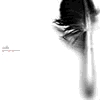 It's horrible to expect someone to fail miserably, but logical toexpect that as humans everyone has the ability to stumble a bit or fallcompletely. Realistically Nathan Amundson should have put out a recordwith at least one bad song by now. He hasn't, and the trend continueson his new five-song EP, as well as his trend of releasing material onas many labels as possible. Whether he has a huge backlog of materialto support this or he just takes up any offer to release an EP isanyone's guess, but it matters little as the songs are alwaystop-notch. Collaborations with Jessica Bailiff also seem to be aregular occurrence — and never a bad thing — as she provides backupvocals and drums on a few tracks. The only discernible difference fromother work is a slight improvement in production, as Amundson's voiceis clearer and fuller, making the harmonies with Bailiff even moredelectable. Lyrics have always been a highlight, and this releaseincludes some of the best: "You've got your own ego to feed... whycan't you ever say what you mean?" Where Debridementcomes off very introspective, these songs are more outward expression,and even storytelling to a certain extent. Threading it all together isAmundson's often delicate guitar work and passive demeanor. There'snever a true emotional distance, but rarely does he sound very moved bythe words: just plaintively presentational. The highlights are thefinal two tracks, however, as the drums on the first and the electricguitar on the second represent a more aggressive stance than I've heardfrom Rivulets in the past, and a welcome one at that. The hauntingfinal minute of "Slight Return" is alone worth the price of admission,but the whole EP proves once again what a stunning talent is present inthe here and now. More to the point, his songs are still torturous attimes, but he seems less tortured and more confident, and that could bea dangerous proposition on a third full-length.
It's horrible to expect someone to fail miserably, but logical toexpect that as humans everyone has the ability to stumble a bit or fallcompletely. Realistically Nathan Amundson should have put out a recordwith at least one bad song by now. He hasn't, and the trend continueson his new five-song EP, as well as his trend of releasing material onas many labels as possible. Whether he has a huge backlog of materialto support this or he just takes up any offer to release an EP isanyone's guess, but it matters little as the songs are alwaystop-notch. Collaborations with Jessica Bailiff also seem to be aregular occurrence — and never a bad thing — as she provides backupvocals and drums on a few tracks. The only discernible difference fromother work is a slight improvement in production, as Amundson's voiceis clearer and fuller, making the harmonies with Bailiff even moredelectable. Lyrics have always been a highlight, and this releaseincludes some of the best: "You've got your own ego to feed... whycan't you ever say what you mean?" Where Debridementcomes off very introspective, these songs are more outward expression,and even storytelling to a certain extent. Threading it all together isAmundson's often delicate guitar work and passive demeanor. There'snever a true emotional distance, but rarely does he sound very moved bythe words: just plaintively presentational. The highlights are thefinal two tracks, however, as the drums on the first and the electricguitar on the second represent a more aggressive stance than I've heardfrom Rivulets in the past, and a welcome one at that. The hauntingfinal minute of "Slight Return" is alone worth the price of admission,but the whole EP proves once again what a stunning talent is present inthe here and now. More to the point, his songs are still torturous attimes, but he seems less tortured and more confident, and that could bea dangerous proposition on a third full-length. It's surprising how little attention has been drawn to the parallelsthat exist between electronic music and lounge/exotica music. Musiciansworking in both genres often focus on creating a mood rather than onwriting songs. Much electronic music also shares the bouncy, cartoonishquality of lounge music. While many modern electronic albums could becalled "percussion" albums, it is rare that an artist actually makes adirect reference to the percussion albums that were so popular in thelate 1950's and 1960's that they actually comprised a genre of theirown. Rather than sounding as if he has raided dollar bins at thriftstores to find cool records to sample from, Percussionsshows that Charles Peirce (End) is a true enthusiast of exotica andlounge music. These 12 short tracks (each of the six titles refers totwo consecutive tracks) fuse samples of all kinds of percussioninstruments (and some brass instruments and voices) with digitalmanipulation. The effects are usually used subtly and enhance thepercussion, bringing the lounge music genre up to date. This isespecially effective during "Go", in which bongo rolls have only aslight digital edge to their sound. Rather than manipulating the sourcesounds beyond recognition, Peirce has made familiar sounds seemslightly askew. Percussions features the intricate beatprogramming that is integral to Peirce's sound, but juxtaposes it withxylophone, harp, and various drums. Although mock-1960's cover art hastruly been overused, this is one case in which that style of artworkactually complements the music. It's a lot more appropriate here thanwhen The Smithereens used a "Living Stereo" logo on a CD from 1994. Percussionssounds more like a tribute to an era than an exploitation of it. One ofits main strengths is that it reminds us that electronic music can befun. While many electronic producers take themselves too seriously,Peirce is not afraid to make fun of the genre and of himself, asevidenced by the vocal sample "Well, let's all get together and stealeach others songs" heard in "Music By Numbers." Percussionshighlights the similarities between lounge music and modern electronicmusic, while not sounding like a stylish genre exercise. While loungemusic samples were one aspect of his 2004 Ipecac CD The Sounds of Disaster, it's nice to hear Peirce fully realize a project focusing on this aspect of his sound.
It's surprising how little attention has been drawn to the parallelsthat exist between electronic music and lounge/exotica music. Musiciansworking in both genres often focus on creating a mood rather than onwriting songs. Much electronic music also shares the bouncy, cartoonishquality of lounge music. While many modern electronic albums could becalled "percussion" albums, it is rare that an artist actually makes adirect reference to the percussion albums that were so popular in thelate 1950's and 1960's that they actually comprised a genre of theirown. Rather than sounding as if he has raided dollar bins at thriftstores to find cool records to sample from, Percussionsshows that Charles Peirce (End) is a true enthusiast of exotica andlounge music. These 12 short tracks (each of the six titles refers totwo consecutive tracks) fuse samples of all kinds of percussioninstruments (and some brass instruments and voices) with digitalmanipulation. The effects are usually used subtly and enhance thepercussion, bringing the lounge music genre up to date. This isespecially effective during "Go", in which bongo rolls have only aslight digital edge to their sound. Rather than manipulating the sourcesounds beyond recognition, Peirce has made familiar sounds seemslightly askew. Percussions features the intricate beatprogramming that is integral to Peirce's sound, but juxtaposes it withxylophone, harp, and various drums. Although mock-1960's cover art hastruly been overused, this is one case in which that style of artworkactually complements the music. It's a lot more appropriate here thanwhen The Smithereens used a "Living Stereo" logo on a CD from 1994. Percussionssounds more like a tribute to an era than an exploitation of it. One ofits main strengths is that it reminds us that electronic music can befun. While many electronic producers take themselves too seriously,Peirce is not afraid to make fun of the genre and of himself, asevidenced by the vocal sample "Well, let's all get together and stealeach others songs" heard in "Music By Numbers." Percussionshighlights the similarities between lounge music and modern electronicmusic, while not sounding like a stylish genre exercise. While loungemusic samples were one aspect of his 2004 Ipecac CD The Sounds of Disaster, it's nice to hear Peirce fully realize a project focusing on this aspect of his sound. 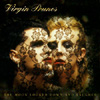 In 1986 the Virgin Prunes released The Moon Looked Down and Laughed, an album that turned out to be the band's swan song. (The group released a collection of outtakes and rare tracks later that year, but never again entered the studio.) Considered in context with the rest of the Prunes' albums reissued by Mute, The Moon was clearly a concerted attempt at a much more commercial sound than anything the band had previously attempted.
In 1986 the Virgin Prunes released The Moon Looked Down and Laughed, an album that turned out to be the band's swan song. (The group released a collection of outtakes and rare tracks later that year, but never again entered the studio.) Considered in context with the rest of the Prunes' albums reissued by Mute, The Moon was clearly a concerted attempt at a much more commercial sound than anything the band had previously attempted.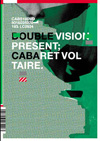 To round out their ongoing series of Cabaret Voltaire reissues, Mute has released Doublevision Present Cabaret Voltaire
on DVD. Originally issued through Factory in 1984, this DVD is
identical to the original VHS release: the same 14 videos in the exact
same sequence. It's a shame they couldn't find something extra to slap
onto the digital version, but it's still a welcome reissue for those
who have no patience for the deterioration of their VHS collection.
Doublevision was a communications company founded by Kirk, Mallinder
and Paul Smith in 1982, with the express purpose of releasing
music-based video for an affordable price, eventually transforming it
into one of the first explicitly audiovisual record labels. This is not
surprising for Cab Volt, who were always two steps ahead of their
contemporaries, it seems. For these 14 videos, Cabaret Voltaire
utilized nascent video editing technology, splicing together television
clips, performance videos and archival film footage, gluing it all
together with low-tech early video effects. The interesting thing about
watching these videos in 2004 is that the primitive video techniques,
which probably seemed piss-poor at the time of their release, now play
into the current avant-garde video art obsession with early 1980's low
budget pirate video aesthetic. 20 years on, this collection of random
video cut-ups and ugly, jagged editing techniques seems positively
vanguard. The tracks presented are from the finest period Cabaret
Voltaire: "Diskono," "Obsession," "Nag Nag Nag," and "Seconds Too
Late," among others, are represented. Televised nature and anthropology
programs are intercut with images of war, death and destruction from
new broadcasts. Clips of Leni Riefenstahl films and videos or surgeries
rub shoulders with grainy, decayed video images superimposed over each
other in a weird Burroughsian collage of overlapping transmissions,
giving rise to a mysterious "third mind" of accidental coincidences and
synchronicities. As experimental video, it all works amazingly well. As
music videos, the effect is somewhat more muted, as the edits often out
of sync with the beat structures of the music. Still, it would be hard
to imagine a more appropriate visual accompaniment to Cabaret
Voltaire's abrasive, subterranean, low-fidelity electronic music.
To round out their ongoing series of Cabaret Voltaire reissues, Mute has released Doublevision Present Cabaret Voltaire
on DVD. Originally issued through Factory in 1984, this DVD is
identical to the original VHS release: the same 14 videos in the exact
same sequence. It's a shame they couldn't find something extra to slap
onto the digital version, but it's still a welcome reissue for those
who have no patience for the deterioration of their VHS collection.
Doublevision was a communications company founded by Kirk, Mallinder
and Paul Smith in 1982, with the express purpose of releasing
music-based video for an affordable price, eventually transforming it
into one of the first explicitly audiovisual record labels. This is not
surprising for Cab Volt, who were always two steps ahead of their
contemporaries, it seems. For these 14 videos, Cabaret Voltaire
utilized nascent video editing technology, splicing together television
clips, performance videos and archival film footage, gluing it all
together with low-tech early video effects. The interesting thing about
watching these videos in 2004 is that the primitive video techniques,
which probably seemed piss-poor at the time of their release, now play
into the current avant-garde video art obsession with early 1980's low
budget pirate video aesthetic. 20 years on, this collection of random
video cut-ups and ugly, jagged editing techniques seems positively
vanguard. The tracks presented are from the finest period Cabaret
Voltaire: "Diskono," "Obsession," "Nag Nag Nag," and "Seconds Too
Late," among others, are represented. Televised nature and anthropology
programs are intercut with images of war, death and destruction from
new broadcasts. Clips of Leni Riefenstahl films and videos or surgeries
rub shoulders with grainy, decayed video images superimposed over each
other in a weird Burroughsian collage of overlapping transmissions,
giving rise to a mysterious "third mind" of accidental coincidences and
synchronicities. As experimental video, it all works amazingly well. As
music videos, the effect is somewhat more muted, as the edits often out
of sync with the beat structures of the music. Still, it would be hard
to imagine a more appropriate visual accompaniment to Cabaret
Voltaire's abrasive, subterranean, low-fidelity electronic music.
